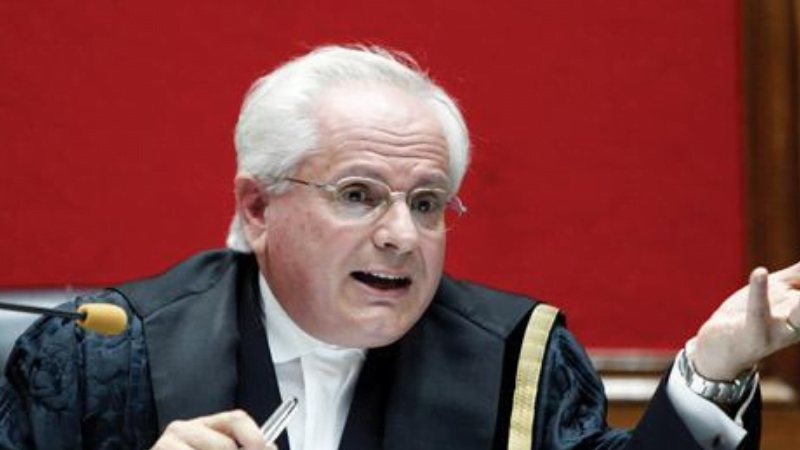Judges at the European Court of Human Rights (ECHR), led by Maltese Judge Vincent de Gaetano, have ruled against Russia in the case of Sergei Magnitsky, a tax advisor and auditor who died in custody in 2009 while awaiting trial.
A decade after his death, the ECHR condemned Russia for “multiple violations” against Magnitsky. The court’s seven judges for the case – including a Russian – ruled unanimously on Tuesday that Russia’s authorities “deprived Mr Magnitsky of important medical care and had failed to comply with their duty to protect his life”.
The ECHR judges concluded that Magnitsky’s treatment during his 11-month detention stood in violation of his human rights, the right to life, right to liberty and security, and right to freedom from torture.
The judges also denounced an “inherently unfair” posthumous trial that found the accountant guilty of tax evasion.
Magnitsky had alleged that various government officials were complicit in corruption that defrauded the Russian State of some $230 million in tax revenue. Russian authorities then arrested and imprisoned him. He died 12 months later.
BREAKING: Sergei Magnitsky’s family wins resounding victory against Russian government at the European Court of Human Rights. ECHR found his right to life was violated, he was tortured, unjustly imprisoned and he didn’t receive a fair trial https://t.co/pRuHyZ0ke9
— Bill Browder (@Billbrowder) August 27, 2019
“The Court found in particular that the medical care given to Mr Magnitsky in prison had been inadequate and had led to his death and that the subsequent investigation had been lacking. He had also been held in overcrowded conditions and had been ill-treated shortly before dying,” according to the ruling.
His case has cast an international spotlight on the Russian government’s handling of whistleblowers, critics and political opponents. Magnitsky’s plight led to international outrage over the erosion of the rule of law in Russia, resulting in the creation of ‘Magnitsky Acts’ in the US, the UK, Canada, Latvia, Estonia and Lithuania. The law authorises governments to sanction specific individuals identified as human rights abusers.
The ECHR ruled that Moscow must pay Magnitsky’s mother and widow $38,000 (€34,000) in damages for violating his human rights, including inhuman and degrading detention conditions, unjustified extensions of his detention, and the posthumous trial and conviction.
The authorities “did not genuinely attempt to shed light on the events that occurred in the hours before Mr Magnitskiy’s death”, therefore the “investigation was not thorough and effective”, according to the ruling.
Experts called to give their opinion on the case said that the lack of adequate medical treatment had been “calculated, deliberate and inhumane” and that doctors and prison staff testifying had been inconsistent. An adequate autopsy had not been carried out, the ruling states.
The court ruled that “the government did not proffer a more convincing or detailed answer on the origin of the injuries” and that explanations were inadequate and poor.
The ECHR ruling provides detailed information on Magnitsky’s prolonged suffering while pointing out that, to date, no individual who had a role in his detention has been held accountable.
The European Parliament has passed a resolution urging Member States to create ‘Magnitsky Acts’.
This is some weird form of projection that villains the world over seem to use. Putin did the same to me by accusing me of murdering Sergi Magnitsky. It just means you’re getting to them. https://t.co/WenwtTHWPD
— Bill Browder (@Billbrowder) August 28, 2019
Bill Browder, a British colleague of Magnitsky and author of ‘Red Notice’, has led the call for the implementation of the Magnitsky Act in countries around the world. He told The Organised Crime and Corruption Reporting Project (OCCRP) that the European Court’s ruling added significant value to the campaign for justice.
“Having a unanimous decision by a panel of ECHR judges that the Russian State tortured and killed Sergei Magnitsky neutralises the Russian smear campaign against Sergei Magnitsky entirely,” he told OCCRP.
Browder has also endorsed the campaign for justice for assassinated Maltese journalist Daphne Caruana Galizia. Only yesterday, he spoke up in defence of her son, Matthew Caruana Galizia, who continues to face accusations by those loyal to the government of killing his own mother.
“This is some weird form of projection that villains the world over seem to use. (Russian President Vladimir) Putin did the same to me by accusing me of murdering Sergei Magnitsky. It just means you’re getting to them,” Browder said in response to Caruana Galizia’s post on social media.













